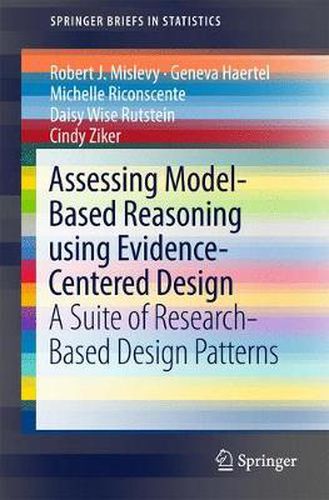Readings Newsletter
Become a Readings Member to make your shopping experience even easier.
Sign in or sign up for free!
You’re not far away from qualifying for FREE standard shipping within Australia
You’ve qualified for FREE standard shipping within Australia
The cart is loading…






This title is printed to order. This book may have been self-published. If so, we cannot guarantee the quality of the content. In the main most books will have gone through the editing process however some may not. We therefore suggest that you be aware of this before ordering this book. If in doubt check either the author or publisher’s details as we are unable to accept any returns unless they are faulty. Please contact us if you have any questions.
This Springer Brief provides theory, practical guidance, and support tools to help designers create complex, valid assessment tasks for hard-to-measure, yet crucial, science education standards. Understanding, exploring, and interacting with the world through models characterizes science in all its branches and at all levels of education. Model-based reasoning is central to science education and thus science assessment. Current interest in developing and using models has increased with the release of the Next Generation Science Standards, which identified this as one of the eight practices of science and engineering. However, the interactive, complex, and often technology-based tasks that are needed to assess model-based reasoning in its fullest forms are difficult to develop.
Building on research in assessment, science education, and learning science, this Brief describes a suite of design patterns that can help assessment designers, researchers, and teachers create tasks for assessing aspects of model-based reasoning: Model Formation, Model Use, Model Elaboration, Model Articulation, Model Evaluation, Model Revision, and Model-Based Inquiry. Each design pattern lays out considerations concerning targeted knowledge and ways of capturing and evaluating students’ work. These design patterns are available at http://design-drk.padi.sri.com/padi/do/NodeAction?state=listNodes&NODE\_TYPE=PARADIGM\_TYPE. The ideas are illustrated with examples from existing assessments and the research literature.
$9.00 standard shipping within Australia
FREE standard shipping within Australia for orders over $100.00
Express & International shipping calculated at checkout
Stock availability can be subject to change without notice. We recommend calling the shop or contacting our online team to check availability of low stock items. Please see our Shopping Online page for more details.
This title is printed to order. This book may have been self-published. If so, we cannot guarantee the quality of the content. In the main most books will have gone through the editing process however some may not. We therefore suggest that you be aware of this before ordering this book. If in doubt check either the author or publisher’s details as we are unable to accept any returns unless they are faulty. Please contact us if you have any questions.
This Springer Brief provides theory, practical guidance, and support tools to help designers create complex, valid assessment tasks for hard-to-measure, yet crucial, science education standards. Understanding, exploring, and interacting with the world through models characterizes science in all its branches and at all levels of education. Model-based reasoning is central to science education and thus science assessment. Current interest in developing and using models has increased with the release of the Next Generation Science Standards, which identified this as one of the eight practices of science and engineering. However, the interactive, complex, and often technology-based tasks that are needed to assess model-based reasoning in its fullest forms are difficult to develop.
Building on research in assessment, science education, and learning science, this Brief describes a suite of design patterns that can help assessment designers, researchers, and teachers create tasks for assessing aspects of model-based reasoning: Model Formation, Model Use, Model Elaboration, Model Articulation, Model Evaluation, Model Revision, and Model-Based Inquiry. Each design pattern lays out considerations concerning targeted knowledge and ways of capturing and evaluating students’ work. These design patterns are available at http://design-drk.padi.sri.com/padi/do/NodeAction?state=listNodes&NODE\_TYPE=PARADIGM\_TYPE. The ideas are illustrated with examples from existing assessments and the research literature.